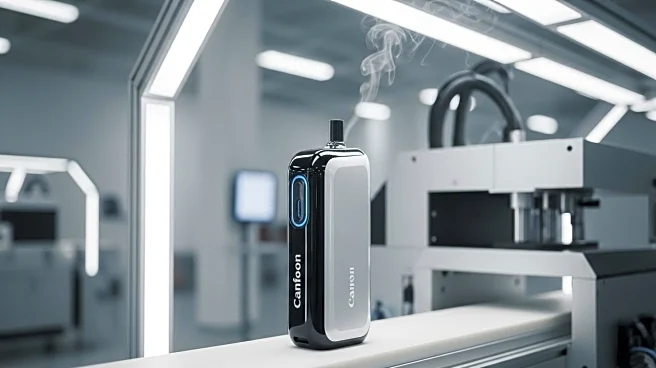What is the story about?
What's Happening?
Philip Morris International's U.S. businesses have announced a $37 million investment in their manufacturing facility located in Wilson, North Carolina. This strategic expansion aims to bolster the company's production capabilities for smoke-free products, aligning with its mission to provide legal-age adults who smoke with better alternatives. The Wilson facility currently produces HEETS for IQOS 3.0, a heated tobacco product authorized by the U.S. Food and Drug Administration (FDA) as a modified risk tobacco product. The investment will add a production line for TEREA, consumables for the IQOS ILUMA system, pending FDA authorization. The expansion is part of Philip Morris's broader initiative to increase U.S. manufacturing and innovation capacity, contributing to economic growth in the region.
Why It's Important?
This investment underscores Philip Morris's commitment to transitioning towards a smoke-free future, which could significantly impact the tobacco industry in the U.S. By expanding its manufacturing capabilities for smoke-free products, the company is positioning itself to meet the growing demand for alternatives to traditional cigarettes. The FDA's authorization of IQOS as a modified risk product highlights the potential health benefits for smokers who switch to these alternatives. The economic impact of the expansion is also notable, as it supports local job creation and reinforces the company's long-term commitment to American manufacturing. This move may influence other tobacco companies to invest in similar technologies, potentially reshaping the industry's landscape.
What's Next?
Philip Morris is preparing for the at-scale launch of IQOS ILUMA, pending FDA authorization. The company has submitted premarket tobacco product applications and modified risk tobacco product applications for IQOS ILUMA to the FDA. If approved, this could lead to further commercialization of smoke-free products across the U.S., expanding their availability beyond current markets like Austin, Texas, and Jackson, Mississippi. The expansion in Wilson is part of a larger investment strategy, including previous investments in Owensboro, Kentucky, and Aurora, Colorado, which collectively aim to create nearly 1,000 direct jobs. Stakeholders, including local businesses and the Wilson Chamber of Commerce, are likely to monitor the outcomes of this expansion closely.
Beyond the Headlines
The expansion of smoke-free product manufacturing raises ethical and health considerations. While these products are marketed as reduced-risk alternatives, they still contain nicotine, which is addictive. The FDA's authorization reflects a balance between promoting public health and providing smokers with less harmful options. The shift towards smoke-free products may also influence public perceptions of tobacco use and regulatory approaches. As Philip Morris continues to invest in smoke-free technologies, it may face challenges related to marketing restrictions and consumer acceptance. The company's efforts to differentiate these products from traditional cigarettes could play a crucial role in their success.
















